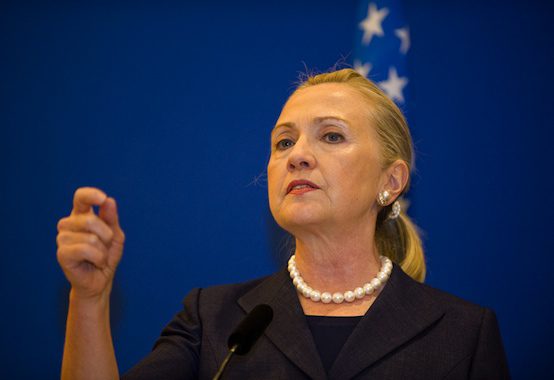Why Joan Walsh Is Wrong About Hillary Clinton & Rand Paul

I’ve been puzzling over why Joan Walsh seems so interested in painting Rand Paul as a vehicle for “neo-Confederates” when domestic race issues are so plainly the least consequential and least interesting thing about Paul’s possible presidential run. I seldom watch political talk shows on TV anymore, so have entirely missed Walsh’s apparently successful run as a liberal MSNBC pundit, where she once goaded Rush Limbaugh to attack her a “magic honkey.” (That I would like to have seen.)
To catch up, I read her partially autobiographical, partially historical book What’s The Matter With White People?—which is very good despite its silly title. I enjoyed the book’s forays into Irish-American history, that of her family and the broader group. The history serves Walsh as a kind of backbone. The varied personalities in her family are probably what gave her the disposition to disagree strongly with her frequent TV sparring partner Pat Buchanan without seeking to anathematize him, the latter of course by far the most common tactic of media liberals and neoconservatives.
Unlike most liberals, Walsh is able to acknowledge the good points traditionalist conservatives make: she notes in passing that the immigration restriction bills of the 1920s had quite favorable consequence for American workers and that the economic solidarity programs she favors seem to flourish pretty exclusively in societies not riven by ethnic divisions (i.e., those which are more homogeneous than multicultural). Such admissions by professional liberals are rare.
More generally she argues that liberalism lost its way in the 1960s and 1970s when it abandoned the economic interests of white working class Americans in favor of more minority-based agenda; her criticisms of elite identity-politics liberalism (now the only liberalism of any consequence) are cogent and have an immediate first-hand feel. In this she reminds me of my old friend Jim Chapin, democratic-socialist activist, Michael Harrington associate, and mentor to many on both left and right. Her book shares themes with Tom Frank’s What’s the Matter With Kansas. (Perhaps Walsh’s maladroit title was intended as a nod to Frank.)
But here is the issue. Walsh is now an influential mainstream liberal political commentator, formerly the editor in chief at Salon. She seems almost certain to back Hillary in 2016, as she did in 2008. She nonetheless realizes that the Clintons did as much or more than any Democrat to ensure their party’s deference to Wall Street—that is, they are deeply entangled with the very forces animating the growing inequality and working class dispossession Walsh deplores. And though Walsh says suitably skeptical things about the Iraq War, she manages to avoid discussing the role that never-ending war in the Mideast has had, and will have, on the American economy. She must also know that Hillary is as tied into the war complex as any American politician, that she voted for the Iraq War and never regretted it, that she is a darling of an Israel lobby now working to ignite a new war against Iran. But Walsh doesn’t mention such things.
She might also perceive that Rand Paul is at least potentially rallying an extremely important insurgency within the GOP, one which acknowledges that Iraq was a mistake, that a war with Iran would be an even bigger mistake, and that it is not America’s destiny to be perpetually fighting wars in the Mideast, and that such a course will end only with the terminal depletion of America’s wealth and liberty—indeed that this depletion is already well begun.
I would like to see Walsh acknowledge that the domestic measures to reduce inequality and buttress the economic security of working class and lower middle class (to create a society economically more like the one she grew up in) can’t be pursued while pursuing a belligerent foreign policy, and that libertarian Republicans like Rand Paul (and Justin Amash) are raising issues that liberal Democrats should also be talking about but for the most part are not. The hawks are already well along in creating liberal/conservative alliances for intervention and war. (A right-wing analyst for the Times of Israel recently noted that “liberal hawk” Samantha Power and John McCain are now joined at the hip; both are fighting “isolationists” and “pacifists” within their own parties.) Having read Walsh’s book, I think she must be aware of the weaknesses in Hillary’s position, and her own.
Yet here is Walsh, once again, attacking Rand Paul. Denigrating Paul, using as a bludgeon Jack Hunter’s old and long disavowed rhetoric to discredit him, seems quite plainly an error of proportion, a kind of making a mountain out of a molehill, which only empowers the neoconservatives she otherwise opposes. The “neo-Confederate” trappings around Paul (which consist, so far as I can see, of little more than a refusal to denounce his former aide) are, at worst, an effort to pander to the identity politics of a shrinking demographic, a pandering which would not be given a second thought if the identity in question was Latino or Italian or Irish rather than Southern white Protestant. By contrast, the perpetual war which Paul is the most prominent national politician to oppose is a genuine present danger.
Like I suppose most of us, I harbor both liberal and conservative impulses. For this reason, I want to kind of like Joan Walsh—a talented, insightful and ideologically unpredictable writer—and hope to draw her to the realization that in any coming contest between a Wall Street-dominated neoliberalism and an antiwar libertarian Republican, her type of liberalism ought not to line up not where she now probably believes it should.
Comments